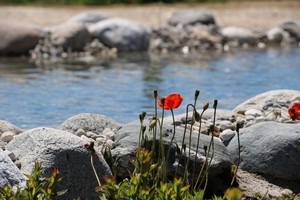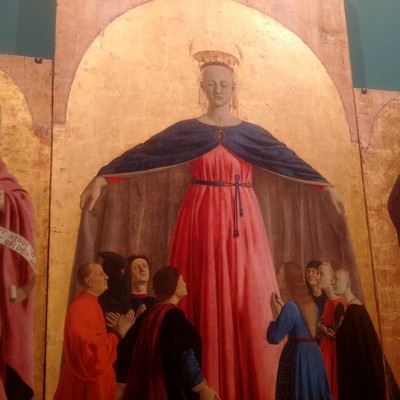Regenerations/6 – It makes our "forever-s" valid. And manages to give itself as a reward
by Luigino Bruni
published in Avvenire on 06/09/2015

Chiara Lubich, The Resurrection of Rome.
Mercy was the cement with which we kneaded our civilization in past centuries. Without knowing and loving mercy we do not understand the Bible, the Covenant, the book of Exodus, Isaiah, the Gospel of Luke, Francis of Assisi, Teresa of Avila, Frances Cabrini, Don Bosco, Christian social works, the Italian Constitution, the European dream, and life together and love affairs after the concentration camps, families living and staying together until the very end.
It is mercy that matures and keeps up our relationships through time, it turns falling in love into love, sympathy and emotional accordance into big and strong projects, it makes our "forever-s" pronounced in youth become a reality, it prevents maturity and old age from becoming just a nostalgic story of broken dreams.
Mercy lives of three simultaneous movements: the eyes, the bowel (rachàm in the Bible) and that of the hands, the mind and the legs. Those who are merciful are first and foremost people that are able to see deeper.
The first instant of mercy is a look that reconstructs the moral and spiritual figure of the one that arouses mercy in us. Before acting to "take care of him," the merciful one looks at him and sees him in a different way. The "not yet" is glimpsed beyond the "already" and the "has already been" appears to all involved. Prior to being an ethical action, mercy is a movement of the soul, with which I can see the other in their original design, before the error and the fall, and I love them in order to recreate their truer nature. Mercy can reconstruct the broken image in the soul, it can reconstruct the interrupted storyline. It can see that there is an inter-human solidarity that is deeper and truer than any crime, it believes that fraternity is not cancelled by any fratricide. It sees Adam again, even after Cain.
And while it perceives purity in impurity, beauty in ugliness, light within the darkness, it also moves the body, and touches one in the flesh. The bowels are moved. Mercy involves the whole body, it is a totalistic experience, something like the birth of a new creature - if there was no mercy, the experience of childbirth would remain totally inaccessible to us males; and yet we can understand something of this mystery, the greatest of all, when we give life with mercifulness. Mercy is something that is felt, it hurts, there is labour in it. It is an embodied experience, it is corporal. For this reason those who know mercy also know disdain: if I do not suffer viscerally from all the injustice and evil around me, I cannot be merciful. The same bowels are moved today by the indignation and anger in front of the children who died locked inside a lorry or drowned in the sea, and tomorrow the betrayal of a friend in need of forgiveness.
Mercy is a blend of gift and virtue. The ability to see the living part of the heart of the other that remains immaculate even after the most heinous crime (it is actually a living part, and it remains alive until the last second of our lives, because if it wasn't so we would only be demons), is not the fruit of our efforts. It is all gratuitousness. It is a gift received from life, from our family and education in childhood and youth. Mercy, however, also needs commitment and virtue, when we have seen through our soul and listened to our guts, we decide freely that it's time for action, the movement of the legs, hands and the mind. Virtue and commitment, which come always after the gift of the "heart of flesh" and the "eyes of resurrection", are therefore necessary in order to conserve and enhance that gaze throughout our lifetime, as it tends to fog up with the passing of the years.
We are not merciful to just anyone, but only against those who are in an condition of error, fault, sin, a situation that touched me personally and wounded me. The first pain at the source of the merciful process is what the merciful person feels for the wrong suffered. That first pain - for treason, for a crime against me or others, for an injustice that reaches me directly or indirectly - must be real and concrete. It is thanks to this first instance of suffering that the different look, the compassion for the pain of the other and the action aiming to heal the wound are activated. That's why mercy is born and exercised first and foremost inside our primary relationships of communion (in fact it is used in the Bible for the relationship between God and his people, for relationships with one's children or friends).
The semantic field of mercy will not cross that of meritocracy. By its very nature, compassion is felt for the undeserving, for he or she who deserves only contempt and revulsion. For this reason we do not find it in the world of economics and big businesses, where it is not present and, if it makes an appearance, it is fought against because it is subversive to all the laws and rules of justice of the markets that know and practice only the merit based logic of the "big brother". Yet mercy is unwise, partial, skewed, unbalanced, biased. That's why capitalism cannot love; but if there wasn't at least one merciful person in every  organization or community, their land would be too poisoned by the toxins they produce, and no good fruit would grow on it.
organization or community, their land would be too poisoned by the toxins they produce, and no good fruit would grow on it.
Mercy, furthermore, has an intrinsic and necessary relationship with forgiveness. The forgiveness of the merciful, however, is forgiveness with its own characteristics. It does not need, for example, the repentance of the other, or that forgiveness is asked. The motion of the bowels and the healing look are activated before the other has acknowledged their guilt and converted - although repentance and contrition are favourable for the activation of mercy. The father waited for his prodigal son on the doorstep when he was still consuming his last resources with prostitutes and when he was eating with the pigs. His standing at the door to look toward the horizon was already mercy. He had "seen" him even when "he was far away". And he will run to meet his son, kiss him and embrace him even before checking on his repentance and conversion. Nothing is more unconditional than an act of mercy. And nothing is more free. Repentance and conversion are often a result of mercy. The "I will arise and go" is very often a mysterious effect of the mercy of someone who, maybe without our knowing, started to think about us and look at us inside their heart with eyes of mercy and healing. We will never know how many departures of liberation have begun from the darkest conditions because someone looked at us with mercy - perhaps while we slept - and healed our wound in his soul this way. And one day we found ourselves able to get up, to get back on the road. The earth is full of roads to liberation from very deep moral and spiritual traps taken up in the heart of the merciful. Rebirths begin by rising in the heart of who looks at us with the eyes of a mother.
Our compassion is always second. I discover, surprised, that I am able to be merciful because someone else was so with me before. When it comes to mercy, the "me" precedes the ''I": someone loved me and cared for me with their guts and with their eyes, and so I have become able to do the same. It is a reciprocity of receiving and giving mercy that is always valid, but is essential when you are little and young. Today, behind a person capable of mercy there hide, invisibly, the many merciful faces that have given him or her the possibility of mercy.
"Blessed are the merciful, for they shall receive mercy." It is a wonderful blessing, the only one that offers only herself as a reward. The promise of mercy is mercy. But what mercy will the merciful find? We have no guarantee - we see it every day - that my being merciful should generate mercy towards myself. Perhaps there is a connection between the instances of mercy offered and received, but the world is also full of merciful people who are not met with mercy on the day they would need it - or they see too little of it in a relationship comparing to how much of it they were originally offered.
But there are two types of mercy that the merciful will certainly "find". The first is that which we have given and that, by giving it, has multiplied. Mercy, just like and even more than the great virtues, grows with its exercise. By practicing mercy you become more merciful. The pain that we dry up in others becomes food that feeds our capability of mercy. Just like poplars and tamarisks that heal and detoxify sick and poisoned soils, trees that feed on harmful substances that make them live and grow. If the world was not inhabited by the merciful - and they are more than we think - all of the land would be poisoned, and the bloom of spring would never arrive.
Another form of mercy that the merciful finds truly precious and sublime, is the one towards him- or herself. Those who are able to practice mercy with others, out of gratuitousness and virtue, one day find realise having received the gift of new eyes with which to look at even those dimensions of their own life that would not want to entertain and that make them suffer. On that day our bowels start to move in the face-to-face meeting with the person we did not want to become but have, with missed appointments, with the wrong direction taken at the crossroads, with the story that we did not want to write and but we did.
While I am leaving Taranto I see that the 640 scions of poplar and tamarisk that some 300 people planted eight months ago have already exceeded three meters in height. They heal and they grow, just like our hope.
Download pdf article in pdf (102 KB)






